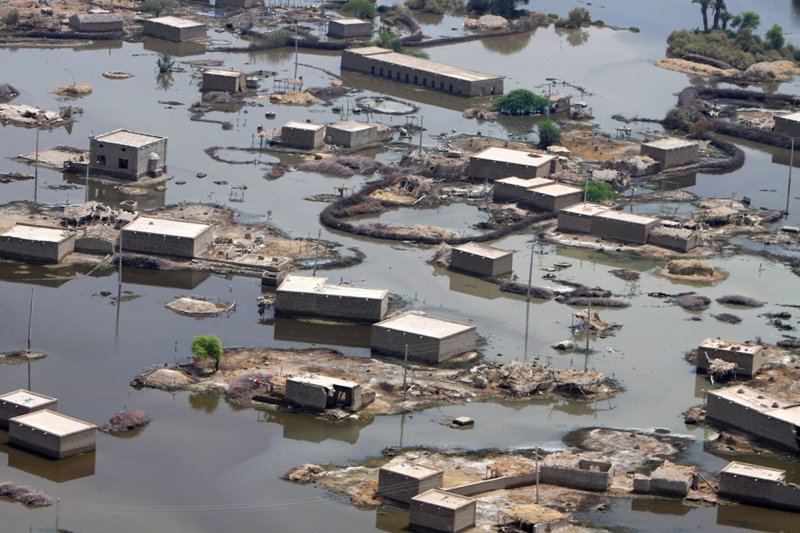An aerial view from a CH-46E Sea Knight helicopter shows extensive flood damage during humanitarian assistance efforts in the southern region of Pakistan, September 4, 2010. UPI/Paul Duncan/USMC |
License Photo
ISLAMABAD, Pakistan, Oct. 14 (UPI) -- Deforestation and global climate change are partly to blame for Pakistan's massive floods, experts say.
Researchers have found that the pattern of Pakistan's monsoon rains have shifted 40-60 miles northwest in the past 30 years, said Azmat Hayat Khan, a scientist at the Pakistan Meteorological Department, The Scotsman newspaper reports.
Khan says there is "strong evidence" the shift was caused by global warming.
"The negative impact of this shift is that the floods have moved from eastern rivers -- where there are four major rivers capable of absorbing these levels of rain -- to western rivers, where there are fewer and they are less able to cope with this water," he said.
As for deforestation in Pakistan, at the current 2 percent to 2.4 percent rate, the country's forest cover would be reduced to half of its 1995 extent by 2019-24, says Pakistan's Food and Agriculture Organization.
"Deforestation played a tremendous role in aggravating the floods," said Ghulam Akbar, director of the Pakistan Wetlands Program, an environment protection group funded by the United Nations and other international organizations, the Los Angeles Times reports.
"Had there been good forests, as we used to have 25 years back, the impact of flooding would have been much less."
For example, loggers had for decades illegally felled and shipped timber from the lush Swat valley, a region of Khyber-Pakhtunkhwa Province, thanks to local officials who offered their silence for a price.
Later, logging also was regarded as a revenue source for the Pakistani Taliban, which gained strength in Swat in 2003. Up to 15 percent of Swat's forest cover disappeared while it was under Taliban control until 2009, the Times said.
Residents in Chail, in the Punjab province, told the Times that there wasn't any woodland left to hold back the force of the massive torrents of rain that fell in July.
"There wouldn't be this amount of destruction if the trees were still here," said a 70-year-old man who lost his home, a guesthouse and everything he owned. "It's OK if you need wood and you cut what you need. But deforestation like this is inexcusable."
The floods, which covered one-fifth of the country, caused an estimated $9.7 billion in damage, the World Bank and Asian Development Bank said Thursday.
Nearly 2 million homes were damaged or destroyed by the disaster, which has affected up to 20 million people.















